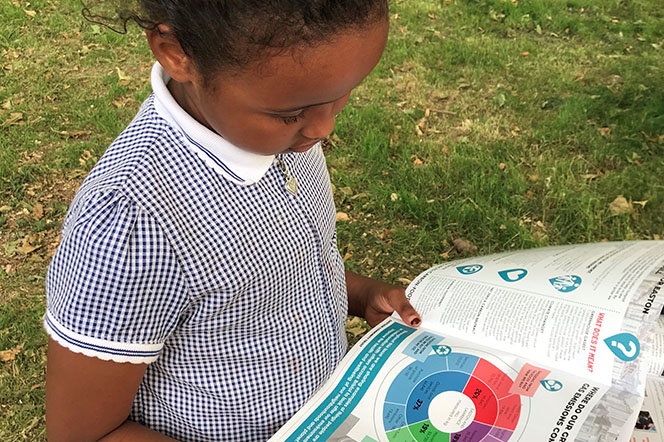Get a community carbon footprint
Themes: Community

Description
So you want to take action, but you’re not sure where to start?
One of the best starting points for communities on their climate action journeys is getting an accurate understanding of the current carbon emissions of their specific neighbourhood or community. This is called a community carbon footprint.
Carbon is emitted as a result of many of the daily activities people take part in – heating homes, driving cars, and consuming food and other products.
Having an understanding of the activities responsible for carbon emissions, and which activities emit the most, can help a community identify which areas to tackle to reduce emissions and really make a difference.
The Centre for Sustainable Energy (CSE) used a broad range of data to develop detailed baseline community carbon footprint reports for the six communities participating in the Bristol Community Climate Action project, to support them in developing their Community Climate Action plans. This included developing pioneering carbon footprint reports for demographic communities (eg. Disabled people or a refugee community within a city). You can download examples of these carbon footprint reports [describe location of where all the links are on web page – over towards the right].
There are several free-to-access carbon footprint resources available online:
- The CSE Impact tool provides detailed carbon footprint for civil parishes
The Place-Based Carbon Calculator estimates the per-person carbon footprint for every Lower Super Output Area (of 1,500-3,000 people) in the UK.
Useful links
Download an example carbon footprint:
Geographic community example – Eastside Community Trust (ECT)
Demographic Community example – Bristol Disability Equalities Forum (BDEF)
Read more about Bristol Community Climate Action Carbon Footprint Reports: Using Community Carbon Footprints to support Climate Action – Bristol Green Capital
Use CSE Impact tool: Impact | Community carbon calculator (impact-tool.org.uk)
Get a community carbon footprint
Themes: Community

Description
So you want to take action, but you’re not sure where to start?
One of the best starting points for communities on their climate action journeys is getting an accurate understanding of the current carbon emissions of their specific neighbourhood or community. This is called a community carbon footprint.
Carbon is emitted as a result of many of the daily activities people take part in – heating homes, driving cars, and consuming food and other products.
Having an understanding of the activities responsible for carbon emissions, and which activities emit the most, can help a community identify which areas to tackle to reduce emissions and really make a difference.
The Centre for Sustainable Energy (CSE) used a broad range of data to develop detailed baseline community carbon footprint reports for the six communities participating in the Bristol Community Climate Action project, to support them in developing their Community Climate Action plans. This included developing pioneering carbon footprint reports for demographic communities (eg. Disabled people or a refugee community within a city). You can download examples of these carbon footprint reports [describe location of where all the links are on web page – over towards the right].
There are several free-to-access carbon footprint resources available online:
- The CSE Impact tool provides detailed carbon footprint for civil parishes
The Place-Based Carbon Calculator estimates the per-person carbon footprint for every Lower Super Output Area (of 1,500-3,000 people) in the UK.
Useful links
Download an example carbon footprint:
Geographic community example – Eastside Community Trust (ECT)
Demographic Community example – Bristol Disability Equalities Forum (BDEF)
Read more about Bristol Community Climate Action Carbon Footprint Reports: Using Community Carbon Footprints to support Climate Action – Bristol Green Capital
Use CSE Impact tool: Impact | Community carbon calculator (impact-tool.org.uk)
Can you suggest an action?
Let us know what you think is missing – or tell us about something else you do to reduce your impact.
